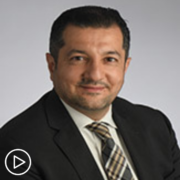Expert Perspective: Hopeful MPN Research and Development
Expert Perspective: Hopeful MPN Research and Development from Patient Empowerment Network on Vimeo.
MPN expert and clinical researcher Dr. Abdulraheem Yacoub shares excitement about the future of MPN treatment and research, including an optimistic outlook for new approvals in the coming year.
Related Programs:

|

|

How Should You Participate in MPN Care and Treatment Decisions? |
Transcript:
Katherine:
I wanted to get your take on the future of MPN research and treatment. Are there new developments that you’re excited about and that make you hopeful?
Dr. Yacoub:
Absolutely. So, again, I would like to take the last few minutes to advocate for the future. And the future can only come when doctors and patients and advocates work together to advance the science. We have few tools to treat patients and to help patients. We have a lot of unanswered questions. And the only way to answer them is by designing quality clinical trials, enrolling patients on trials, taking the risk, and trying to find new answers and new therapeutics. So, I always would like to advocate for patients to seek clinical trials whether with their doctor or whether they have to travel for it, and for doctors to consider that for their patients. That’s the only way to advance science.
There are very important national and international studies going on right now. One of the – and first, I would like to emphasize is that we have had ruxolitinib (Jakafi) as the only therapy, or the first-line therapy for myelofibrosis for a decade now.
Not everybody responds to it, not everybody responds to it for a long time. So, now we’re designing combination trials. So, there’s a few studies that we are trying to redefine, “Is ruxolitinib alone enough, or should we have a combination first-line therapy?” So, these are some of the more important questions being asked right now.
And this is definitely one of the bigger moves in the field, is trying to redefine what is the first-line therapy for myelofibrosis. For polycythemia vera, we’re also exploring therapeutics that would reduce phlebotomy with things you can add to your medical care to reduce phlebotomy.
So, that’s also going on. And it’s definitely a big leap forward for many of our patients. For ET, when we don’t have any actual drugs approved other than hydroxyurea (Hydrea) and anagrelide (Agrylin), we actually have trials with interferon going on.
So, I would like to advocate for that. So, interferon succeeded and now approved for PV, but not yet for ET. We’re working on that. So, again, in every disease, we’re trying to design clinical trials to redefine what is the best treatment today.
We’re also doing studies to understand the cancer. So, studies where patients donate their samples for research. These are very helpful, very important. And contributing to that always advances the science, and it’s low effort to the patients. So, if there’s a clinical trial that is offered to patients, I would strongly urge everybody to consider that favorably and contribute to science.
That’s the only way we can help future patients and ourselves immediately, at moving the field forward.










